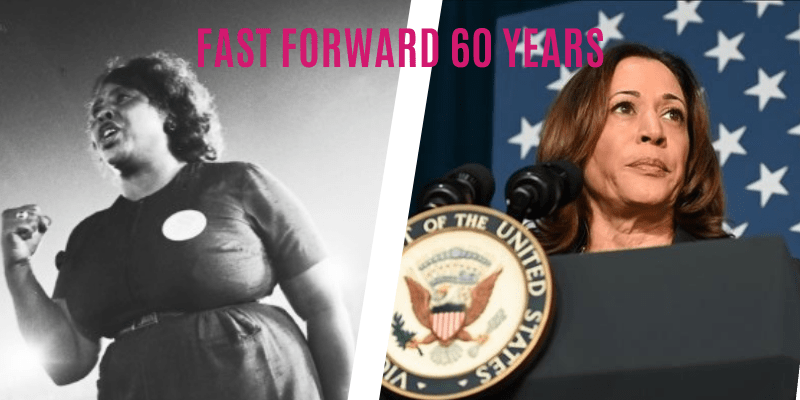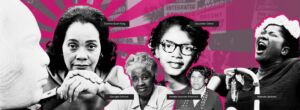By Gwen McKinney
Democrat (noun): One who supports democracy; A “small-d” democrat may also be an avid big-D Democrat, a marginal one, or not at all. Their allegiance embraces democratic values and inclusion of people, ideas and policies. Democracy literally means rule by the people; derived from 5th Century Greek word dēmokratia, root dēmos (“people”) and kratos (“rule”).
As the Democratic Party convenes the national convention in Chicago August 19, the imprint of heroic warriors like Fannie Lou Hamer is indelible. She came to the 1964 convention seeking a seat at the table, to be seen and heard on behalf of farmers, sharecroppers and rural communities in the poorest state in the nation. Her delegation was rebuffed by the Democratic powerbrokers.
Fast forward six decades. Who could imagine that a Black woman would be nominated to lead the ticket for the Democratic Presidential Campaign. It is in the spirit of Fannie Lou Hamer and countless Black women small “d” democrats who sacrificed blood and determination, that we hail the nomination of Kamala Harris.
__________________________________________________________________________________________________________________
Sixty years ago, Fannie Lou Hamer led the Mississippi Democratic Freedom Party delegation to the Democratic Party National Convention in Atlantic City. They stirred controversy and concern, testing democracy at the same time they exposed the hypocrisy of the party leaders – both southern segregationists and northern patriarchs.
Demanding they be seated as state delegates, Fannie Lou Hamer, a passionate voting rights advocate, drew rapt attention as she shared the harrowing beating she experienced at the hands of Mississippi Police. She ended with this passionate oratory:
“All of this is on account we want to register, to become first-class citizens, and if the Freedom Democratic Party is not seated now, I question America. Is this America – the land of the free and the home of the brave, where we have to sleep with our telephones off the hooks because our lives are threatened daily because we want to live as decent human beings in America?”
Hamer’s testimony was so powerful that President Johnson, from Washington, contrived an impromptu press conference to divert national media attention away from Hamer’s passionate demands.
Adversity and struggle were familiar to the Mississippi toddler in rural Ruleville who was destined to back-breaking toil, poverty, and second-class citizenship. Like uncounted women who would precede and follow, hers was the unfinished business of Black women’s suffrage and citizenship.
FANNIE LOU HAMER WAS BOTH EXTRAORDINARY AND EVERYWOMAN.
Her quest for citizenship was fused by intersectional advocacy for health, housing, education and economic empowerment. By the time she was six, Fannie Lou – the youngest of 20 children – would join her family in plantation work. Though stricken with polio, the youngster could bail up to 300 pounds of cotton a day.
Fannie Lou embodies what suffrage meant for Black women in the 20th Century. Like everywoman, she knew that making do with what she had was not enough. And as the activist extraordinaire, she would frontally take on the oppressive system; stared down peril, shot at, beaten, jailed, threatened and told by a White supremacist, “…We’ll make you wish you were dead.”
PROLIFIC AS AN ORGANIZER AND VISIONARY, FANNIE LOU WAS A CONSUMMATE COLLABORATOR ACROSS RACE AND GENDER DIVIDES.
She launched Mississippi Freedom Summer with the Student Nonviolent Coordinating Committee and joined a coalition of White women to form the National Women’s Political Caucus. With the National Council of Negro Women, she also launched the Pig Project providing protein to impoverished sharecroppers, and to institutionalize rural self-sufficiency she started the Freedom Farm Cooperative.
Never silenced or erased, she launched a campaign for Mississippi’s open U.S. senate seat –five years before Shirley Chisholm’s successful run in the House.
HAMER’S ACTIVISM WAS UNRELENTING, AS WERE THE MALADIES THAT SENT HER TO AN EARLY GRAVE AT 59.
During a surgery for removal of a uterine tumor in 1961, she was “treated” to an unauthorized hysterectomy. This widely practiced forced sterilization of Black and Native American women was labeled by Fannie Lou as a “Mississippi appendectomy.”
In 1963 during the brutal assault by Mississippi police, she recalled being beaten so badly that her eyes were swollen shut. Hamer suffered long-term illness and trauma including a blood clot in her left eye, kidney damage and other injuries that never healed.
In the 1970s, faltering health and conditions described as “nervous exhaustion” slowed her activism. The trail she blazed for democracy and full citizenship would be followed by successive generations of Black women into this century.
Wise Woman’s Words
Fannie Lou Hamer was a self-educated woman forced to trade sharecropping duties in the field over a seat in the school house. Her powerful homespun oratory blended the cadence of ‘old time’ religion with mother wit assurance. In the spirit of Fannie Lou, we share some of her memorable musings.
- Her famous words — first delivered December 20, 1964 at a rally attended by Malcolm X – are inscribed on her tombstone: “All my life I’ve been sick and tired. Now I’m sick and tired of being sick and tired.”
- The first time Fannie Lou was turned away from the courthouse, denied ability to register, the plantation boss man scolded that she did not have his permission to register and that Mississippi was not ready for that. Fannie Lou, who was summarily fired, answered: “I wasn’t trying to register for you…I was registering for myself.”
- Embracing the importance of aligning with White women to build voting power, she stated: “A white mother is no different from a black mother. The only thing is they haven’t had as many problems. But we cry the same tears.”
- To the constant threats of Klan and police assaults, she said: “I guess if I’d had any sense, I’d have been a little scared—but what was the point of being scared? The only thing they could do was kill me, and it kinda seemed like they’d been trying to do that a little bit at a time since I could remember.
Is This America?
Fannie Lou Hamer, a Mississippi sharecropper who became one of the movement’s most passionate and powerful voices, is the focus of the film “FANNIE.” Christine Swanson directed the nine-minute film and actor Aunjanue Ellis portrays Fannie Lou Hamer with an equal blend of resolute dignity and simmering rage. Swanson keeps the camera tightly focused on Ellis, whose performance does justice to Hamer’s legacy in a wrenching description of the brutal beatings Hamer endured in a Mississippi jail for daring to register to vote.
The film includes actual audio from Hamer’s testimony before the Democratic National Convention Rules Committee in a quest for the Mississippi Freedom Democratic Party to be seated at the 1964 convention. Hamer and her comrades boldly took on the all-white Mississippi delegation and the Johnson administration.
The camera rarely moves from Ellis’ face, framed as Hamer was shot in a live television newscast. When the camera does move, it shows the shocked faces of white Democratic Party officials. Viewers of the powerful short film, like the party officials in the archival clips, will be transfixed and unable to look away.





